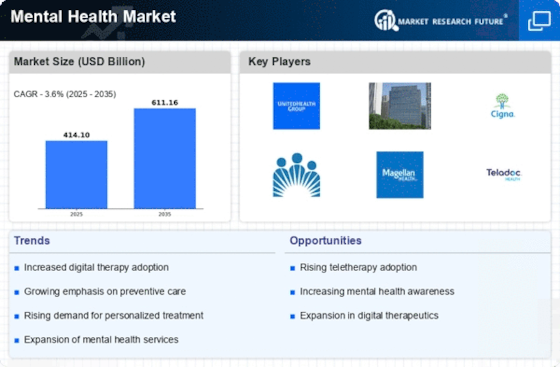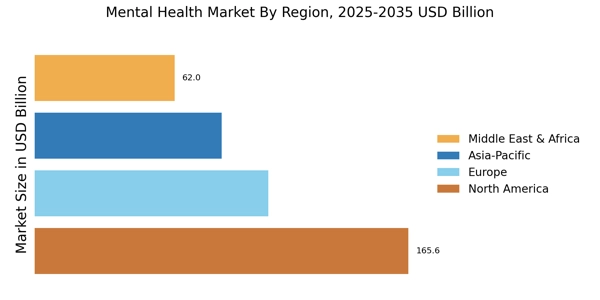Increased Awareness of Mental Health Issues
The rising awareness of mental health issues has become a pivotal driver in the Mental Health Market. Public campaigns and educational initiatives have contributed to a greater understanding of mental health conditions, reducing stigma and encouraging individuals to seek help. According to recent data, approximately 1 in 5 adults experience mental illness each year, highlighting the urgent need for accessible mental health services. This awareness has led to increased demand for various mental health solutions, including therapy, counseling, and medication. As more individuals recognize the importance of mental well-being, the Mental Health Market is likely to expand, with a projected growth rate of around 7% annually over the next several years. This trend suggests a shift towards prioritizing mental health as a critical component of overall health.
Rising Prevalence of Mental Health Disorders
The rising prevalence of mental health disorders is a significant driver influencing the Mental Health Market. Current estimates indicate that nearly 450 million people worldwide suffer from mental health conditions, underscoring the urgent need for effective treatment options. This increasing prevalence is attributed to various factors, including societal pressures, economic challenges, and changing lifestyles. As more individuals seek help for their mental health issues, the demand for diverse treatment modalities, such as psychotherapy, medication, and support groups, is expected to escalate. The Mental Health Market is likely to expand in response to this growing need, with projections indicating a compound annual growth rate of approximately 8% over the next five years. This trend highlights the critical importance of addressing mental health as a public health priority.
Technological Advancements in Mental Health Solutions
Technological advancements are reshaping the Mental Health Market, offering innovative solutions that enhance accessibility and effectiveness. The proliferation of mobile applications, online therapy platforms, and artificial intelligence-driven tools has transformed how individuals engage with mental health services. For instance, the use of teletherapy has surged, with reports indicating that over 60% of mental health professionals now offer remote services. This shift not only broadens access for those in remote areas but also caters to the preferences of younger generations who favor digital interactions. As technology continues to evolve, the Mental Health Market is expected to witness significant growth, with an estimated market value reaching over 200 billion dollars by 2027. This evolution indicates a promising future for mental health care delivery.
Integration of Mental Health Services in Healthcare Systems
The integration of mental health services within broader healthcare systems is a crucial driver for the Mental Health Market. This approach facilitates a more holistic view of patient care, recognizing the interplay between physical and mental health. Recent studies suggest that integrated care models can lead to improved patient outcomes and reduced healthcare costs. As healthcare providers increasingly adopt this model, the demand for mental health professionals and services is likely to rise. The Mental Health Market is responding to this trend by developing collaborative care programs that enhance service delivery. This integration not only improves access to mental health resources but also encourages early intervention, which is essential for effective treatment. The potential for growth in this area is substantial, as healthcare systems worldwide prioritize comprehensive care.
Policy Changes and Increased Funding for Mental Health Services
Policy changes and increased funding for mental health services are emerging as vital drivers in the Mental Health Market. Governments and organizations are recognizing the necessity of investing in mental health care, leading to enhanced funding for programs and services. Recent legislative efforts have aimed to improve access to mental health resources, with some countries allocating significant portions of their healthcare budgets to mental health initiatives. This shift in policy not only supports the development of new services but also encourages research and innovation within the Mental Health Market. As funding increases, the potential for expanding mental health services and improving treatment outcomes becomes more pronounced. This trend suggests a promising future for mental health care, as stakeholders prioritize mental well-being in their agendas.


















